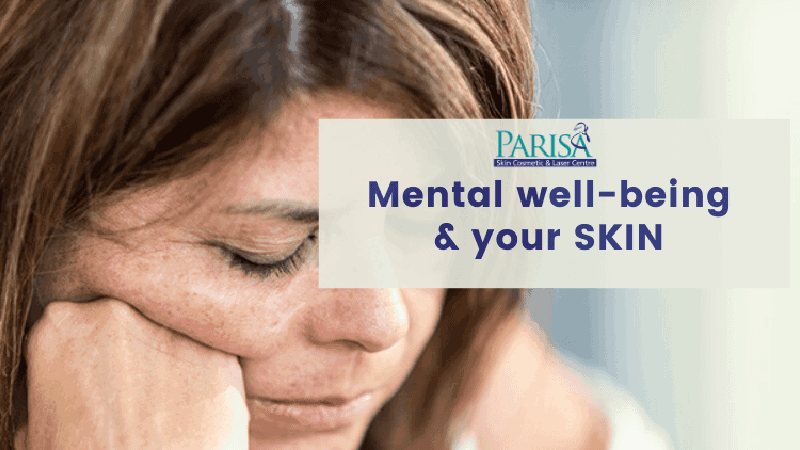MENTAL WELL-BEING AND YOUR SKIN
The skin is our first line of defence from the outside world and healthy skin is important for a healthy body and mind as well as reflects our overall health and physical well-being. Our skin is the first to form and the largest organ in our body accounting for 16 percent of our total body weight. The skin is one of the first things people see and on which their first impression of an individual is based.
The long list of functions includes protecting us from the world around us, help control body temperature, and help maintain the water balance in the body. The skin has many thousand sense organs that provide information about the world around us. And, it is closely associated with our sense of touch. Touch is an important part of communication, feeling connected to others, and emotional stability. This sense of touch is important from the moment we are born and remains so throughout our lives. Often a simple contact with another human being will make us feel better whenever we are physically or emotionally hurt.
Skincare is self-care. It is considered to be a genuine way of feeling safer, secure when carried out religiously and those suffering from anxiety, depression and other mental health concerns find that it definitely helps them with their symptoms.
It’s at least 2-3 minutes when we look at ourselves and watch ourselves looking after us. In our busy day to day life, it is invaluable to take out some me-time.
When our skin improves, our feelings around it will also show a positive change if we keep a track of it very closely. Sometimes our patients rely on other people to tell them that their skin is improving or they don’t see a difference themselves. If one doesn’t observe a change, they don’t feel good about it. That’s why it’s important to be patient during their skin treatment when it comes to the results and also to celebrate the success when it comes to skin treatment also and acknowledge that it is improving now.
Nutrition, Mental Wellbeing, and Our Skin are interrelated. A balanced diet is what we need for both Happy Skin and Happy Mind. The field of nutritional psychiatry is constantly growing. The various studies point towards the fact that our mood can be defined by our food. Did you ever notice you are bit screwed up after gulping a bag of jellies instead of usual lunch?
The brain and skin are both the organs and they both benefit from similar nutrients because most of the time inflammation is the root of both skin problems and mood changes. A diet rich in antioxidants and probiotic components as well as right amounts of proteins, fats, carbohydrates, vitamins, minerals, and low in food ingredients that inflame us like caffeine, alcohol, processed foods, and refined sugar, benefits our skin and mind both.
So, eating clean means an improvement in both - how one feels in mind and how their skin feels. This means one also feels better when their skin feels better and the skin feels better when they feel better, So, vice-versa is true.
The skin disease can impact an individual’s many areas of life. There is often a perceived stigma among the people suffering from skin conditions present on the visible skin areas. In one study, 26 percent of patients studied reported an incident where someone had tried not to touch them. Skin disease can impact one’s relationships with others, both a romantic and friendly nature. Several mental health issues can occur alongside skin diseases like depression, body dysmorphic disorder, delusional disorders, obsessive-compulsive disorder, and social anxiety disorders. Anxiety has been linked to the development of skin rashes, urticaria & also triggers the flares of skin conditions like herpes simplex according to a recent study. Among skin diseases reported to be exacerbated or triggered by stress are psoriasis, eczema, acne, and herpes simplex. Negative emotions can affect the immune system and cause changes in the response via inflammatory cytokines. This, in turn, affects the mechanism of inflammatory skin conditions and worsens them. When anxious or stressed, there can be significant skin changes like increased water loss, increased skin redness, and increased oil production in the skin.
In a study carried out on people with chronic skin conditions like acne, rosacea, eczema, psoriasis or rosacea, fungal infections, 31% complained about low mood; 31% stated that it made them feel embarrassed and self-conscious, 19% said that it made them feel anxious and worried, 12% said that it made them want to isolate themselves and 6% felt that life was not worth living.
If a skin concern like acne, eczema, psoriasis, vitiligo, fungal infections, or rosacea is affecting mental health, it is crucial to visit a dermatologist for advice and ask them to recommend a skincare routine customised on an individual basis.
It helps to nip these things in the bud and get them sorted whether it is about seeking help for skin concerns or mental health.
The stigma surrounding mental health is slowly being broken and the need of the hour is that we need to prioritise ourselves and our health.
In simple words, there are no negatives to looking after yourself, only positives, so make time rather than an excuse. There is only one you out there in the world!
